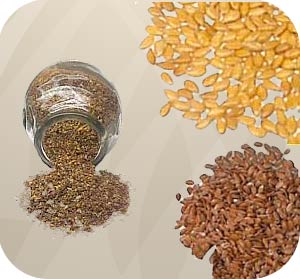Flax Seed

The flax seed is said to have originated in Mesopotamia during the Stone Ages. Since the Greek and Roman civilizations, it has been widely used and acclaimed for its nutritive composition. Flax seeds are known as Linum usitatissimum. This generic name means 'most useful' – an apt description of the nutritive power packed within this tiny seed.
Abundant with the goodness of omega 3 fatty acids, flax seed is used in many recipes and baked dishes. The benefits of flax seed oil are many. Flax seed contains lignans that may play a major part in protecting your body against hormone-related cancers. Its rich omega- 3 content is ideal for those seeking to reduce total cholesterol levels.
Flax seed oil benefit
Flax seeds are smooth and flat and are found in golden and reddish brown colors. Flax seeds are slightly larger than sesame seeds and have a hard shell that is smooth and shiny. You can pick up brown or golden flax seed as they both contain the same nutritional composition. Buying flax in its seed form offers longer shelf life whereas ground flax seed is more convenient for use in a host of simple recipes.
Whole flax seed will keep for months if stored in an airtight container. You can also pick up flax seed oil, popular for its sweet and nutty flavor. Add to your foods after cooking and never during it as it loses its nutritive value. Flax seed is finding its way into many baking mixes and yeast breads on account of its nutritive value.
Flax seed is the best plant source of omega 3 fatty acids. Flax seed is rich in EFA – Essential fatty acids. They are particularly valuable because the body needs them to function properly, but can't manufacture them on its own. Essential fatty acids work throughout the body to protect cell membranes. Alpha-linolenic acid (ALA), an omega 3 fatty acid found in flax seed is said to help in the treatment of various ailments.
Eicosapentaenoic acid (EPA) is also another form of omega 3. Flax seed is particularly rich in lignans, special compounds also found in other seeds, grains and legumes. Since flax seed oil is highly prone to rancidity since light and oxygen can break down the essential fatty acids. Purchase flax seed oil that is bottled in dark containers. If you are going in for flax seed capsules, look for those in dark coated soft gel capsules.
Flax seed benefit
- Flax seed is seen as an important food to protect against diseases such as cardiovascular illness or cancer. The soluble and insoluble fiber content in flax seed makes it an excellent food to fight against breast and prostrate cancer. Lignans and alpha-linolenic acid that are found in abundance in flax seed may be responsible for its cancer –fighting properties.
- Flax seed has cholesterol lowering properties. With a combination of omega 3 fatty acids and soluble fiber, it can favorably affect blood lipid patterns. In a study conducted by the University of Toronto, consumption of flax seed showed reduced levels of total cholesterol and LDL.
- Including about 50 gm of flax seed into your daily meals can give you relief from constipation.
- Skin problems like eczema and acne can often attributed to omega 3 deficiency. The anti-bacterial and anti-fungal properties of flax seed oil offer many benefits.
- Omega 3 EFA may help improve your response to stress. It improves the body's production of energy and also increases stamina.
- Flax seed oil helps protect the body against high blood pressure, inflammation, water retention, sticky platelets and lowered immune function.
- Flax seed oil benefits include supporting better absorption of Calcium and improving liver function.
- Flax seed oil is known to relieve the symptoms of Rheumatoid Arthritis.
- Hormone-balancing lignans and phytoestrogens in flax seed oil help stabilize a woman's estrogen-progesterone ratio. Flax seed is known to reduce symptoms of PMS. Essential fatty acids in flax seed oil have been shown to block production of prostaglandins that cause heavy bleeding. These lignans promote normal ovulation and promote consistent ovulation.
- The Essential Fatty Acids in flaxseed oil may help to prevent swelling and inflammation of the prostate. It can lead to reduced instances of prostrate enlargement and be used in treating male infertility.
- Lignans found in flax seed oil may protect against various effects of aging.
- Flax seeds are a good source of magnesium, which helps to reduce the severity of asthma by keeping airways relaxed and open.
- The Essential Fatty acids in flaxseed oil aid in the transmission of nerve impulses, making the oil potentially valuable in treating conditions of numbness and tingling.
- Omega 3 fatty acids in flax seed oil can contribute to healthy hair growth and nail growth. Use of flax seed can benefit those suffering from brittle nails and dry hair.
Flax seed recipe
Incorporate flax seed into your own recipes to add to the nutritive value. Add flax seed when baking muffins or cookies. Add ground flax seed to your shakes or smoothies. Top up stir-fried vegetables with ground flax seed. Flax seed oil can be used for dressing up salads. You can mix it with yogurt or cottage cheese chunks. Store flax seed oil in opaque bottles to avoid spoilage from light.
Mix flax seed while blending your morning shake. Use it with milk, raspberries, banana, honey and wheat germ. Use ground flax seed in your recipe for marshmallows. Stir it with the other ingredients to add nutritive value.
Cookie recipe with flax seed
flax seed 2 cups
oatmeal 3 cups
butter 1 1/3 cups
granulated sugar 1 1/4 cups
brown sugar 1 1/2 cups
large eggs 3
vanilla 1 1/2 tsp
all-purpose flour 3 1/2 cups
baking soda 1 tbsp
Mix butter and sugar till creamy. Add flax seed to this mixture. Beat eggs and combine with the mixture. Add vanilla. Sift flour and soda and add oatmeal. Add to the mixture and form dough. Chill the dough for some time. Make small rolls for cookies and place them on a baking tray. Bake at about 180°C for about 15 minutes.
Ground Flax Seed
Since flax seeds are hard to chew, ground flax seed is more popular. Consuming ground flax seed allows for enhanced nutrient absorption. You can use a food processor or blender to grind flax seed at home and use it to add an interesting twist to your recipes. Ensure that ground flax seed is carefully stored to prevent loss of flavor and taste. You can refrigerate ground flax seed in an airtight opaque container. This will keep for about 3 months.
Flax seed oil side effects
Ground flaxseed may produce some initial flatulence, but this won't last long. Ensure that you drink plenty of water to prevent ground flaxseed from swelling up and obstructing your throat or digestive tract. Some side effects of flaxseed are stomach discomfort, diarrhea and nausea. Other rare side effects include watery eyes, difficulty in breathing and rash. People who are allergic to the Linaceae plant family will need to avoid this.
Possible side effects of flaxseed allergy may include rash, itching or shortness of breath. Be cautious when taking flax seed if you have high blood sugar level. Pregnant women are not advised to take flax seed for fear of birth defects and spontaneous abortion. Consumption of flax seed may reduce the effectiveness of many drugs, vitamins and minerals.
Top of the Page: Flax Seed
Tags:#flax seed #flax seed oil #flax seed benefit #benefit of flax seed oil #flax seed recipe #ground flax seed #flax seed oil side effects
 Food and Nutrition Facts
Food and Nutrition Facts Chamomile
Parsnip Soup
Dim Sum
Gazpacho Soup
Whole Grain Cereal
Jicama Nutrition
Bok Choy Stir Fry
Chia Seeds Benefits
Teff Nutrition
Kaniwa
Flax Seed
Wheatgrass Benefits
Kelp Benefits
Types of Chili Peppers
Medicinal Benefits of Pomegranate
Arugula Leaves
Maca Root
Pitaya Fruit
Benefits of Celery
Leek
Asparagus Benefits
Oyster Stew
Oyster Mushroom
Lupin Beans
Quinoa
Freekeh
Extra Virgin Olive Oil
Dill Pickle
Sauerkraut
Fat Burning Foods
Nutrition Chart
Food Combining
Calorie Counter
calories ...
Non Alcoholic Beverage
Punch Recipes
Food Label Nutrition
Homemade Sausages
Cooking Steak
Eating on a Budget
Budget Friendly Recipes
Quick Recipes
 Healthy Packed Lunch
Healthy Packed Lunch Overnight Oats Recipes
Eggplant Casserole
Brunch Recipes
Burrito Recipes
Muffin Recipes
Cupcake Frosting
Apple Crisp
Stir Fry Cooking
Seafood Salad Recipe
Cooking Corn on the Cob
Finger Food Recipe
Sandwich Recipe
Bread Stuffing Recipes
Easy Chili Recipes
Picnic Recipes
Edible Mushroom Recipes
Mushroom Soup Recipes
Dip Recipe
Tapas Recipe
Corned Beef Recipe
Canned Salmon Recipe
Tilapia Recipes
Crumb Cake
Flourless Chocolate Cake
Regional Food
 Lasagna Recipe
Lasagna Recipe Peruvian Ceviche
Chinese Food Recipe
Vietnamese Food Recipe
Malaysian Food
Korean Food Recipe
Indian Curry Recipe
Edible Rice Paper
Mexican Food Recipe
Quesadilla
Guacamole Dip
Italian Food Recipe
Spanish Food Recipe
Kosher Food
Falafel Recipe
Tandoori Chicken
Noodles
Canape
Couscous
Meatloaf
Chowder
Gumbo Recipe
Crockpot Recipes
Moroccan Food
Healthy Food
Pre Workout Snack
Matcha Tea
Simple food Swaps to Lose Weight
Foods to Beat Stress
Foods to beat Insomnia
Bone Density Foods
Prebiotic Foods
Kefir Grains
Agave Nectar
Spicy Trail Mix
Pesto Sauce
Homemade Hummus
Crab Cake Sauce
Bamboo Shoots Nutrition
Lemon Grass Plant
Butter Beans Recipes
Loose Green Tea
Seaweed Nutrition
Healthy Food
Low Fat Granola Bar
Steel Cut Oatmeal
Fruit Pizza
Pizza Toppings
Green Smoothie
Healthy Meal Planning
Delicious Mealtime Recipes
Heart Healthy Fats
Healthy Heart Recipe
Healthy Dinner Recipe
Healthy Dessert Recipe
Healthy Fast Food
Healthy Kid Recipe
Probiotic Food
Diabetic Friendly Foods
Fruit Salad Recipe
Bread Pudding
Tofu Recipe
Oat Bran
Broccoli Salad
Avocado Recipe
Iron Rich Food
Brain Foods
Antioxidant Food
Natural Diuretic
Low Fat Cooking Tips
Rice Pilaf Recipe
Low fat Chicken Recipe
Food Tips

Sous Vide Cooking Technique
Natural Sugar Substitute
Stevia Sugar Substitute
Sunflower Seeds Nutrition
Bouquet Garni
Cake Decorating Tips
High Satiety Foods
Thanksgiving Dinner
Safe Food Storage
Frozen Food Storage Tips
Cold Storage Food Tips
Leftover Recipe
Food Pyramid
Dairy Free Food
Microwave Cooking
Food Intolerance
Homemade Ice Cream
Apple Cider Vinegar
Benefits of Honey
Beverage Cooler
Food Poisoning Symptom
Food Allergy Symptom
Food Addiction
Top of the Page: Flax Seed
Popularity Index: 102,169

